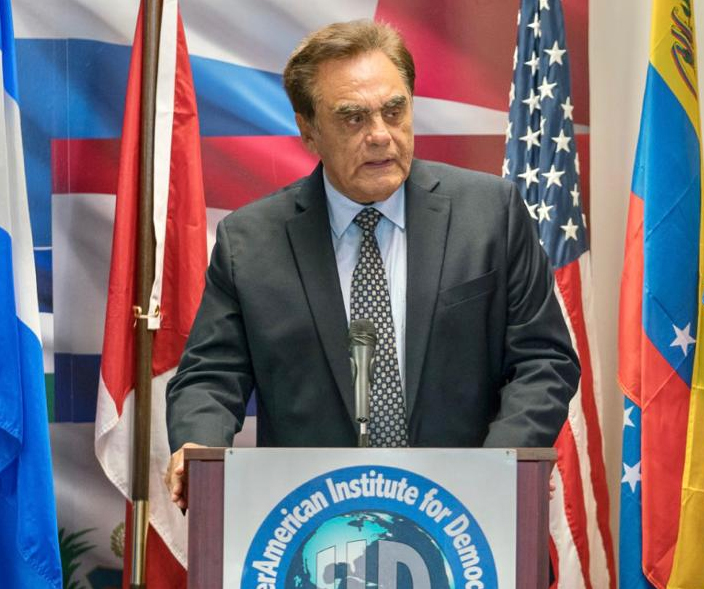Hunting the killer

By: Luis Gonzales Posada - 28/02/2025
Share:
The 11th Guarantee Court of Santiago de Chile filed a criminal complaint against 19 criminals from the gang “Los Piratas”, a cell of the “Tren de Aragua”, charging them with the murder of Venezuelan Army lieutenant Ronald Ojeda Moreno, and also announced that they will go to the International Criminal Court (ICC) because several arrested criminals confessed that they were hired by the Chavista regime, through the Minister of the Interior, Diosdado Cabello.
Ojeda has been in prison since April 19, 2017, with 33 fellow soldiers, members of the Movement for Freedom and Democracy, accused of terrorism and of attempting to kill dictator Nicolás Maduro.
The officers were taken to the basement of the General Directorate of Military Counterintelligence, DGCIM, but Ojeda managed to boldly escape, throwing himself onto the pavement from the vehicle that was taking him to the military court.
He was in hiding for several months and moved to Chile, which granted him political asylum.
In November 2022, television filmed Ojeda on his knees, with his arms outstretched and a black bag on his head in front of the Palacio de La Moneda, the seat of government, demanding elections and freedom for political prisoners.
Ojeda had thus become a dangerous symbol of resistance and, therefore, a target of the Chavista regime. His life was in danger and, despite constantly changing his address, he felt under surveillance, until he disappeared on February 21, 2024.
The press of the neighboring country presented a video from the surveillance camera of the elevator of the building where he lived, "taken in his underwear from his house at 3:10 in the morning, by several hooded men dressed in black, with helmets, balaclavas and bulletproof vests, heavily armed."
Ten days after the kidnapping, her body was found in a suitcase buried at a depth of one and a half meters and sealed with cement, with obvious signs of torture.
Ojeda left a valuable testimony of the atrocities he suffered in a diary that recounted his captivity. There are 185 autobiographical pages where he narrates the barbaric acts to which he was subjected and reveals the corruption of the Army, including the theft of ammunition to sell to Colombian guerrillas of the FARC and the ELN.
In that document, remember:
- "Electric shocks became routine practice when trying to make you talk. Mechanical asphyxiation and beatings with mechanical bars wrapped in sponge are to show you that the law does not exist there [...] The dark rooms and isolated cells are intended to dominate your mind, to lead you to internal conflict so that you assume self-blame."
The Santiago newspaper “La Tercera,” which reproduced part of the document, points out that the account “details how he was hung on a wall for hours, or how they submerged his head in a bucket of water so that he would speak and give some testimony that they wanted him to repeat. This was the case for 13 days.”
Killing exiled opponents is a common practice of autocracies
In 1974, the former commander-in-chief of the Chilean Army, General Carlos Prats, and his wife were assassinated in Buenos Aires, Argentina, by a car bomb, and in 1976 Salvador Allende's former foreign minister, ambassador Orlando Letelier, was killed in Washington by a remote-controlled bomb, both during the Pinochet dictatorship.
The long arm of repression also crosses continents, as the Russian satrap Joseph Stalin demonstrated when he hired the Spanish hitman Ramón Mercader to kill Leon Trotsky, former president of the Revolutionary Military Soviet, who had taken refuge in Mexico.
Despite police surveillance of his house, Mercader accomplished the mission by stabbing Trotsky in the skull with a sharp ice axe.
The criminal, however, was awarded by Stalin with the “Order of Lenin”, the highest award of the USSR, and named “Hero of the Soviet Union”. He was sentenced to 20 years in prison and after serving 17 years of imprisonment he returned to Moscow, where he lived comfortably until his death.
Today, Chile has the historic opportunity to take Maduro to the ICC court. A legal hunt for the hitherto unpunished Chavista assassin, which, if successful, would represent a reward for democracy, freedom and human rights.
«The opinions published herein are the sole responsibility of its author».